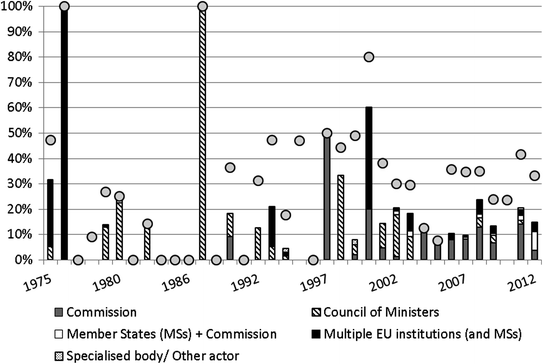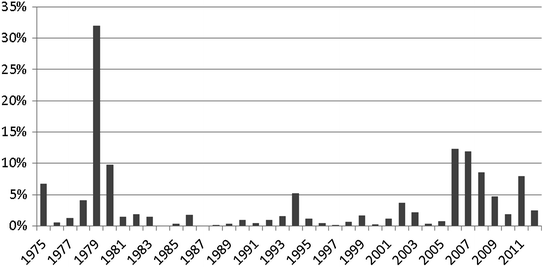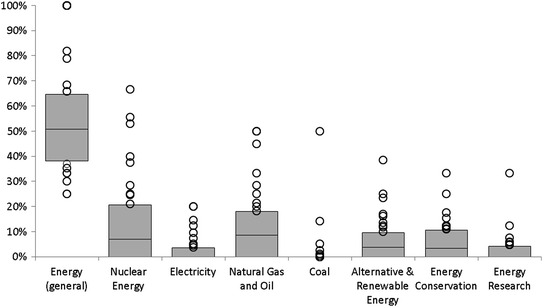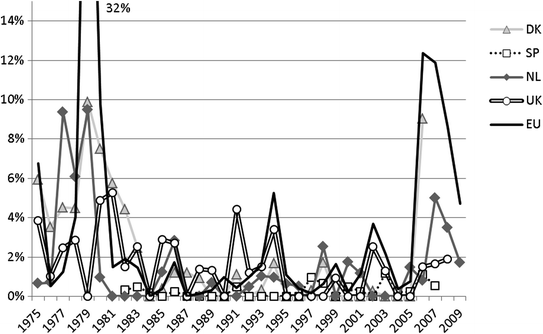Agenda Dynamics on Energy Policy in the European Council

Attention (%)
Topic (ranking in terms of overall agenda share)
23
International affairs (1)
15
Macroeconomics (2)
10
Governance (3)
7
Defence (4) and banking, finance and internal trade (5)
6
Employment (6)
5
Law and crime (7)
4
Environment (8), civil rights and liberties (9) and immigration (10)
3
Energy (11) and foreign trade (12)
2
Science and technology (13), social policy (14) and agriculture (15)
1 or less
Transportation (16), regional policy (17), education (18), health (19), culture (20) and lands and water (21)
Thus, while the EU has many formal competencies on agriculture and (until the Lisbon Treaty of 2009) very limited powers on energy policy, such issues may be signalled at quite different levels of attention in the European Council. Since this institution is also a major venue for engineering European treaty changes, attention to problems can lead to expansion in competencies at a later stage (see Biesenbender in Chap. 2 for an assessment of the institutional and legal foundations of EU energy policy over time). This is what happened with European energy policy between the 1970s and the present. While the average proportion of European Council policy talk devoted to energy is rather modest, this hides large variation over time. For the size of the issue, variation in salience is quite large—from no attention at all to about one-third of the attention devoted to all problems within a single year.
In Fig. 3.1, we see that the appearance of energy problems on the European Council agenda follows a pattern of low key salience most of the time (the theme disappeared from the agenda twice in the 1980s) but interrupted by some peaks in attention, most visible in the 1970s and in the past decade. The spikes in 1975 and 1979–1980 relate to the first and second international oil crisis and signified a sense of urgency to resolve problems with oil supply in the future. Another energy-related crisis provoked a rather tiny surge in attention in 1986. The Chernobyl disaster was noted but at that time the accident’s location was still relatively distant from the territory of the Community. Notably in later years, this tragedy left a mark on the enlargement and neighbourhood policies of the EU. In 1999 the European Council promoted a broad partnership with Ukraine where a comprehensive energy sector reform was envisaged. Around the turn of the century some acceding member states had to comply with EU conditions for nuclear safety. A smaller-scale crisis which also emerged in the attention pattern was the disruption of Russian gas supply in late 2008–early 2009. While the EU had agreed on a comprehensive energy policy in preceding years, the disruption urged the government and state leaders to stress that security of energy supply remained a priority. Finally, an increase in attention occurred in 2011, part of which was triggered by the nuclear power plant disaster in Fukushima and another part related to matters of energy supply and sustainability.


Fig. 3.1
Attention to energy as a share of the whole European Council agenda, 1975–2012
Energy issues on the agenda of the European Council have also been aspects of more comprehensive policy initiatives in this domain, in which the Commission was involved since the 1990s with a series of white and green papers. One broader set of plans was the European Energy Charter, which was proposed in 1990 and signed in the end of 1991 by 51 signatories. It aimed at cooperation with other industrialised countries for securing energy supply. Eventually it resulted in the Energy Charter Treaty of 1994. Another significant example is the Energy Policy for Europe, which was initiated and discussed extensively in 2006–2007. It represented the EU’s attempt to reduce energy consumption, maintain security of supply and undertake a shift towards a sustainable and competitive energy use. The climate change debate which entered the political agenda also played a major part in preparing an expansion of EU energy policy competencies in the next European treaty signed in Lisbon in 2007 and enforced in December 2009 (see Ciambra and Solorio in Chap. 8 for an analysis of the British government in shaping the EU energy-climate agenda). The priority actions of this recent EU policy included internal market for gas and electricity, energy efficiency and renewable energies, energy technologies or research in sustainable energies, security of supply and a common approach to external energy policy. A review of the policy was carried out in 2011 and new actions were announced. In May 2013 these energy policy issues recurred on the agenda.3
Thus, it seems that attention to issues within the energy domain in the European Council has come mostly in two forms: reaction to focusing events and ‘high politics as usual’ regarding issues requiring strategic attention and broader plan development. This finding provides empirical support for the claim by Buchan (2010) that energy policy in the EU is driven by focusing events. However, it shows that detailed designing and routine monitoring of large policy plans can also act as an attention propeller in the European Council in this policy field.
We note at this point that the attention pattern as we analysed it from year to year hides even more variation from one European Council summit to the next. With an increased number of data points (there are some five or seven meetings per year in recent times), we see an even more erratic pattern of low attention and prominence over time. For example, the European Council meeting of 22 May 2013 was devoted largely to energy issues, which followed a number of meetings where these issues were barely addressed. Such focused summits by the European Council may indicate how this institution of high politics processes problems serially—very few at a time. When issues are addressed, they are meant to set the policy-making machinery elsewhere in the EU in motion and endorse initiatives politically. It is likely that years of rising attention to energy on the European Council agenda are followed shortly by policy output (see Biesenbender in Chap. 2).
3.7 Multilevel Attention to Energy Policy
The European Council is the key venue of the high politics route. It is crucial for signalling and for endorsing attention to problems of broad EU concern, in which energy is an episodically occurring theme. In this role the institution interacts with other policy-making bodies at the EU level and with the governments of the member states. The horizontal link entails the policy-making traffic with the Commission and the Parliament as well as a specific body such as EURATOM. Before the European Council summit devoted in large part to energy policy in May 2013, a huge banner on the EU internal energy market on the Commission’s Berlaymont building in Brussels advertised plans under construction. The European Council Conclusions delegating this task to the Commission were thus testimony of a link between agenda shaping and the following steps in policy formulation (see Herweg in Chap. 5 for a comparative analysis of the processes of agenda shaping and policy formulation in the context of the European gas directive). This link was strengthened after the Lisbon Treaty, which included new EU responsibilities on energy policy.
More generally, the European Council agenda provides the basic and strategic pointers for more specific energy issues to be addressed within the other institutions where regulatory fine print is produced. This can be observed in Fig. 3.2 where we see that about half of the energy agenda normally is devoted to such broad policy talk. Nuclear energy and natural gas and oil are the two more specific energy topics addressed next to the general theme.


Fig. 3.2
Relative annual attention to energy-related issues in the European Council, 1975–2012. All coded statements per year to energy-related issues = 100 %
The other subtopics in this domain mentioned in Fig. 3.2 get less on average and also at times of rising salience they rarely dominate the energy policy part of the agenda. Energy conservation and alternative or renewable energy are not typical matters of high politics, and the same applies to electricity. Attention to them in the European Council is incidental. In this analysis, we have not considered linkages of energy policy issues to other topics such as environment, international security or the internal market and competition policy. Such linkages were crucial in the development of energy initiatives in the EU given the narrow limits of EU competencies in this area.
Further, even with few formal competencies at the EU level, the international or supranational nature of this theme was emphasised. The first concerns about energy in the European integration process already related to international energy security (Tosun 2011). As the analysis of the period since 1975 suggests, the aim of securing supply or repercussions of foreign energy crises adds a strong international dimension to the attention devoted to energy. Likewise, eastern enlargement of the EU made the relationship with Russia on energy supply more prominent (see Brutschin in Chap. 10 and Tosun in Chap. 12). Thus, energy issues have travelled across levels within the EU and between the EU and the international environment. In the European Council Conclusions, only some 40 % of the overall energy agenda can be considered internal to the EU.
Figure 3.3 presents attention development on the governmental agenda in four member states compared to the European Council.4 The oil crisis is visible in some countries, in particular the Netherlands, which already in the 1970s had a European main port function for oil import and refinery. And in the UK, attention to energy was at a higher level in the 1980s during the years of Margaret Thatcher, who set a course of emphasising privatisation.


Fig. 3.3
Attention to energy on governmental agendas in four member states compared to the European Council, 1975–2009. Some national data are missing, 2007–2009 for Denmark, 1975–1981 and 2008–2009 for Spain, 2008–2009 for France and 2009 for the UK
Generally, however, attention levels in member states were below the level displayed in the European Council. In at least one-third of all the years analysed for individual member states since 1945, energy issues were absent from the annual executive speech while such absence of energy talk was much rarer in the European Council. One reason for this difference may be the broader scope of the policy agenda in member states compared to European institutions (which have a smaller range of jurisdictions). Our findings may also indicate that attention to energy policy in the European Council is meant for signalling and driving initiatives on the substantive policy agenda elsewhere. We consider this delegation of policy tasks further below.